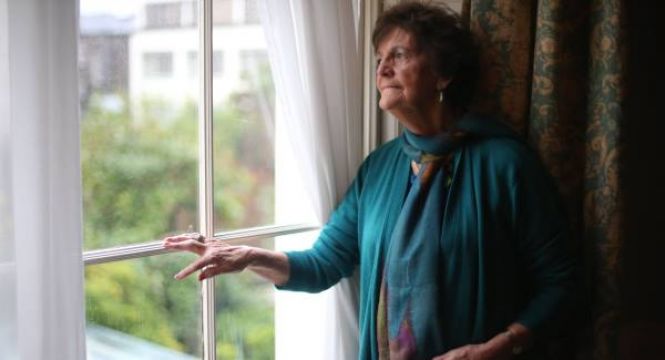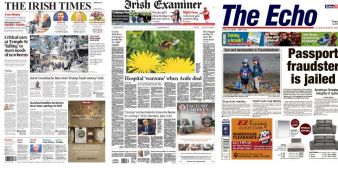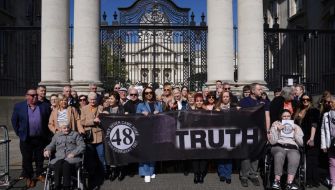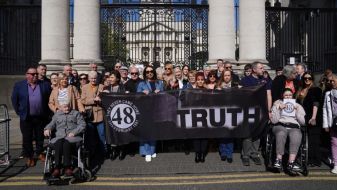Some points raised in the High Court cases taken by two former residents of mother and baby homes relate to a “difference of view” about the Commission of Investigation’s findings and do not raise issues of fair procedure, counsel for the State has said.
Eoin McCullough SC, representing the State parties, said many of the issues raised by the applicants are disagreements about the substance, and sometimes the conclusions, of the report of the Commission of Inquiry into Mother and Baby Homes.
Mr McCullough said there were many points in Ms Lee’s case which do not conflict with the commission’s report when “read fairly as a whole”.
He said the substance of her complaint on one of the report’s findings is that she might have liked a greater reference to one of her assertions and she “might have liked a different finding”.
Ms Lee’s submission that it “isn’t good enough” to blame the treatment of the women in the homes on the societal morals of the time, is a “simple difference of view” between her and the findings of the report, said Mr McCullough.
He said the commission was tasked with taking into account vast amounts of evidence and to “reach its own conclusions”.
Core claim
As the commission has been dissolved, Philomena Lee, now in her 80s and living in England, and Galway-based Mary Harney are bringing their challenges against the Minister for Children, the Government, Ireland and the Attorney General.
Mr Justice Garrett Simons is hearing the two lead cases that address a core claim in nine separate but similar actions concerning the scope of section 34 of the Commission of Investigation Act 2004.
Both women say they are readily identifiable in the final report, despite not being named, triggering a requirement, under section 34 of the Act, for the commission to provide them with the draft report, so they could make submissions on it, including on the treatment of their evidence.
The State denies the claims and points to the independence of the commission and the scale and complexity of the materials it had to consider.
Ms Lee was sent to the Seán Ross mother and baby home in Co Tipperary in 1952 after becoming pregnant at the age of 18.
Mr McCullough pointed to parts of the report about adoptions and said there was no conflict between the report as a whole and Ms Lee’s testimony.
Mr McCullough submitted that the report acknowledges and does not conflict with Ms Lee’s submission that she was not given time to read a document that relinquished her right to her son.
Further, he said the report does not say, as Ms Lee submitted, that women who gave birth in the homes were not offered pain relief.
Rather, the report says there was no evidence that the women there in the 1970s were refused pain relief that would have been offered to women who gave birth in maternity hospitals at that time, he said.
Submissions that the women were told during childbirth that they would have to “suffer for their sins” were actually contained in the report, he said.
At odds
Mr McCullough said Ms Harney’s objection to the report’s treatment of the experiences of people who were boarded out is about a “difference of emphasis” rather than a breach of fair procedure. Ms Harney was born in Cork’s Bessborough mother and baby home and was boarded out between 1951 and 1954.
Previously, counsel for Ms Lee said there were “numerous” findings in the commission’s final report that are “at odds” with the testimony she submitted to the confidential committee. Michael Lynn SC, for the applicants, said the commission has painted an “incomplete, inaccurate picture” of what took place during Ms Lee’s time in the home.
Mr Lynn had argued that “highly publicised” information about Ms Lee, including a book and film based on her life, was relevant to alleged issues of fact as well as her alleged identifiability.
Neither applicant would have objected to being identified in the report, but Ms Harney is concerned that some of her evidence was allegedly “not recorded fairly” and an important aspect was “completely missing” from the report, he said.

A finding that section 34 of the 2004 Act would have required the draft report or parts of it to be sent to anyone who is identifiable, would have “dramatic consequences” for the running of inquiries, Mr McCullough said.
He submitted that it was the intention of the Act that provisional copies be sent only to people against whom allegations are made or whose good name is at risk, which, he said, would not include the applicants.
If the applicants’ “very extreme” interpretation is correct, said Mr McCullough, then the Commission would have been obliged to send extracts to “many thousands of people”.
He also argued that the threshold of identifiability, as the Act intended, has not been met.







